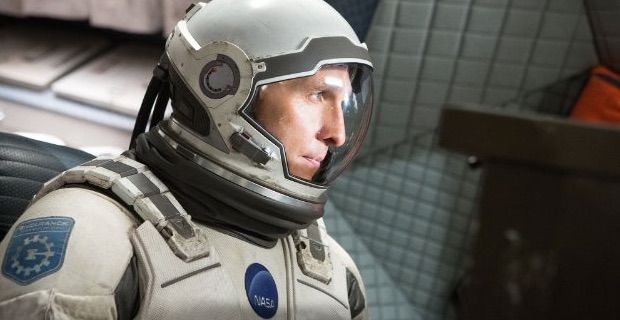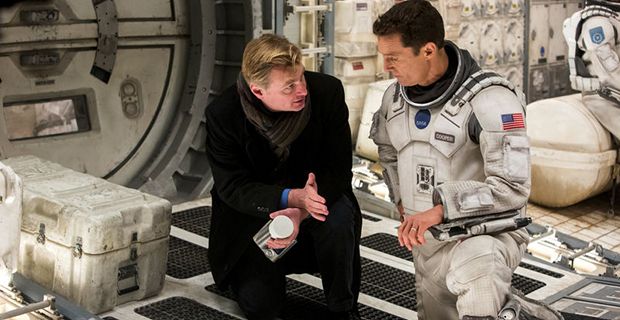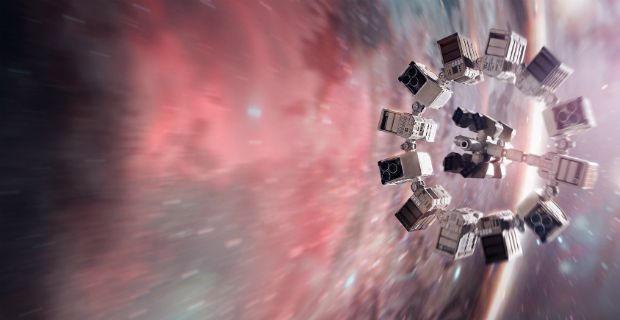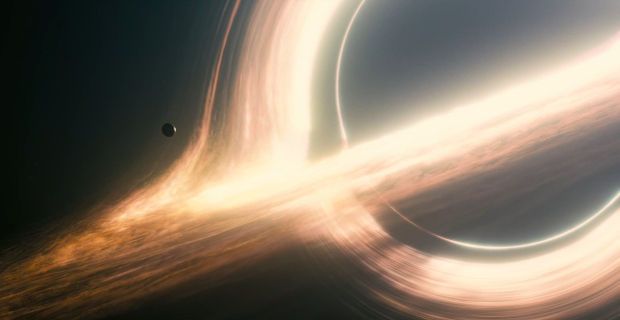Following a successful run of mind-bending films including Memento, The Prestige, and Inception, not to mention a beloved take on the Dark Knight, it should come as no surprise that Christopher Nolan's latest (and arguably most ambitious) project, Interstellar, is earning solid box office ticket sales. While the film struggled to beat Disney's latest CG animation offering, Big Hero 6, Nolan's film still earned a respectable $47 million opening weekend in the U.S. (along with an additional $82 million in foreign markets).
Critics were quick to point out that Interstellar marked the filmmaker's lowest opening weekend in over a decade but a philosophical journey into space starring Matthew McConaughey was never expected to top a crowd-pleaser like Inception (or Batman franchise installments) - and, after all, $132 million globally is nothing to scoff at. Still, Interstellar once again fueled the flames in an ongoing battle between fans who love Nolan's work and detractors who think the filmmaker is downright overrated.
This time, as evidenced by the comments in nearly any Interstellar article on our site, the director's portrayal of theoretical science concepts has become a central point for debate - as many moviegoers were either fascinated or frustrated by Nolan's interpretation of wormholes and space time relativity. Plenty of watchers land somewhere in between but fault-finders have highlighted a number of (debatable) plot holes, as evidence of the filmmaker's ineptitude, whereas viewers who enjoyed the film maintain that most of the supposed "plot holes" aren't actually plot holes and, instead, are evidence that critics simply didn't understand the film's science.
Now, nearly one week after Interstellar first debuted in IMAX theaters, Nolan is addressing criticisms of the film - in an earnest interview with The Daily Beast that acknowledges both viewpoints: admitting that there are plot holes while also insinuating that the high bar he has set for cerebral movie experiences also made him a target for nitpicking:
To be honest, I haven’t read whatever holes people are trying to poke so I can speak to the validity of it. My films are always held to a weirdly high standard for those issues that isn’t applied to everybody else’s films—which I’m fine with. People are always accusing my films of having plot holes, and I’m very aware of the plot holes in my films and very aware of when people spot them, but they generally don’t. But what were some science issues people had with the film? That was Kip’s domain.
To Nolan's credit, we were able to explain many of the movie's scientific theories in our Interstellar Ending & Space Travel Explained post - theories which have also been backed-up by well-known astrophysicist Neil deGrasse Tyson (who was previously critical of scientific accuracy in Alfonso Cuaron’s megahit Gravity).
In the interview Nolan freely admits that some leeway had to be made for the film medium but that Interstellar is firmly rooted in current theoretical physics - specifically those of advisor (and acclaimed physicist) Kip Thorne. As a result, even though some allowances were made, many of the biggest sticking points (or "plot holes") may actually be more grounded than viewers might think at first glance - especially how a black hole could impact time relativity:
Like “a basketball on the rim,” which is a phrase we use! That’s completely accurate, so there’s no hole there at all. Those issues are all buttoned-up, and Kip has a book on the science of the film about what’s real, and what’s speculation—because much of it is, of course, speculation. There have been a bunch of knee-jerk tweets by people who’ve only seen the film once, but to really take on the science of the film, you’re going to need to sit down with the film for a bit and probably also read Kip’s book. I know where we cheated in the way you have to cheat in movies, and I’ve made Kip aware of those things.
It's easy to understand where Nolan is coming - given that, at the end of the day, Interstellar is still a science-fiction movie. Would moviegoers be as worked up about theoretical/speculative science in a Doctor Who or Star Trek episode? Maybe... maybe not.
At the same time, defending the film by pointing to Thorne's theories (and book) also indicates that Interstellar was designed from the ground-up to be more scientifically accurate than "everybody else's films" - meaning that, even though criticisms might be unfair, they're not entirely unfounded. It's clear that Nolan was intrigued by modern astrophysics and attempted to make a film that blended family drama with high-minded scientific speculation - an ambitious mix that left room for a wide variety of responses from viewers (and reviewers).
That said, for many, Interstellar's science isn't the film's biggest problem - it's that Nolan's reach for philosophical rumination may have exceeded his grasp on basic storytelling fundamentals. As pointed out in our Interstellar review and podcast discussion, while much of the movie's science can be accepted with a little suspension of disbelief, character development and impactful drama often take a backseat to scientific explanation. The result is a movie that, like Nolan, spends a disproportionate amount of its near-three hour runtime attempting to defend its core ideas - leaving an uneven series of dramatic highs and lows in the wake. After all, Interstellar wouldn't be the first time that the filmmaker had been criticized for being "All brain, No heart" - a point that was recently brought-up in our editorial, 5 Christopher Nolan Movie Criticisms That are Totally Valid.
Nevertheless, even if Interstellar isn't a flawless masterpiece by a perfect director, it's still a film worthy of viewing and subsequent discussion. Even with a few plot holes or underdeveloped character arcs, Nolan's imagination and ambition are a welcome addition in an industry dominated by reboots, sequels, and shared universes.
NEXT: Interstellar Ending & Space Travel Explained
-
Interstellar is currently playing in regular and IMAX theaters.
Follow me on Twitter @benkendrick for any future updates on Interstellar, as well as movie, TV, and gaming news.
Source: The Daily Beast




